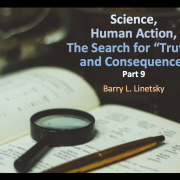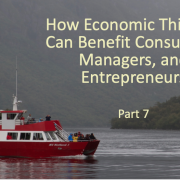How Economic Thinking Can Benefit Consumers, Managers, and Entrepreneurs | Part 6: The Unseen Unintended Consequences of Intended Actions
Barry L. Linetsky
Journalist and author Henry Hazlitt (1894-1993) does an excellent job presenting the importance of recognizing and always taking into consideration the likely unseen and unintended consequences of intended action in the realm of economics in his classic book Economics in One Lesson.
The summary of that one lesson, writes Hazlitt, is that
in studying the effects of any given economic proposal we must trace not merely the immediate results but the results in the long run, not merely the primary consequences but the secondary consequences, and not merely the effects on some special group but the effects on everyone.
Henry Hazlitt, Economics In One Lesson (p. 89 in above link to pdf)
Failing to think beyond the immediate initial consequence or limiting one’s analysis of cause and effect to a single point of interaction demonstrates what Hazlitt refers to as a “persistent and lazy habit of thinking” that is exceedingly common: “These [economic] fallacies pervade not merely the arguments of the hired spokesmen of special interests, but the arguments of even some economists who pass as profound.” (P. 89 in above link to pdf).
The economic fallacies identified by Hazlitt that result from a “persistent and lazy habit of thinking” also pervade the realm of managerial leaders across all sectors (business, government, and social) to the extent that they too fail to think about and take into consideration the rippling consequences of their actions and the implications upon a wider integrated and interconnected business and social system.
Too often the focus is on what is immediately visible and easy to see and convey, with careless or wilful disregard given to what is unseen and less visible in time and space yet is a required consideration to achieve a successful business outcome that corresponds to one’s intentions.
For example, most business cost-cutting exercises fail to follow Hazlitt’s advice to trace the implications of action beyond the immediate short-term implications on a single group (often with the focus on the shareholder).
Consider the all too common tactic of cutting costs to increase profits by reducing the perceived value delivered to consumers. Consumers are provided slightly less value over time, as measured against their desires and expectations, in an extended series of small incremental changes to a successful formula or business model, until finally they realize that the product or service they enjoyed and valued is no longer so.
Suddenly, a viable and profitable business finds itself in a state of crisis as, over time, its customers defect to seek more satisfying and meaningful alternatives. In many cases the change in consumer behaviour has been brought about by a wilful management policy and corporate culture of persistent and expediently lazy first-order thinking. Of course a diminishing value equation will lead to diminishing value and result in consumers making new choices.
© 2019, Barry L. Linetsky. All Rights Reserved.
Barry Linetsky is a Partner with The Strategic Planning Group in Toronto, Canada, where he and his colleagues have been helping executives and owners align their business purpose with customer values since 1994. Barry is the author of the acclaimed book The Business of Walt Disney and the Nine Principles of His Success (Theme Park Press), and an Honorary Disney History Institute Historian. Barry is also a writer, photographer, researcher, and business strategy enabler. Read his blog and learn more at barrylinetsky.com.

 Barry L. Linetsky, 2019
Barry L. Linetsky, 2019 © 2022 Barry L. Linetsky, All Rights Reserved
© 2022 Barry L. Linetsky, All Rights Reserved

 Barry L. Linetsky, 2019
Barry L. Linetsky, 2019 © 2020, Barry L. Linetsky. All Rights Reserved
© 2020, Barry L. Linetsky. All Rights Reserved
 Barry L. Linetsky, 2019
Barry L. Linetsky, 2019 Barry L. Linetsky, 2019
Barry L. Linetsky, 2019 Barry L. Linetsky, 2019
Barry L. Linetsky, 2019 Barry L. Linetsky, 2019
Barry L. Linetsky, 2019
Leave a Reply
Want to join the discussion?Feel free to contribute!